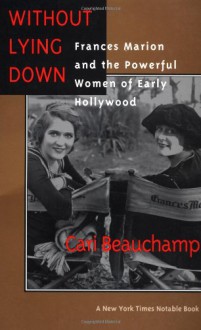
I know I'm enjoying a book when I have the urge to tell someone "oh this bit, check this out, isn't this fun?!" Plus this quote gives you an idea of Marion being a normal woman, as well as understanding how women think differently. Neat story all round.
Backstory: Marion is on her third husband (she's in her 20s), and totally in love and happy - they both have careers in film, they both love each other's intelligence, all the good stuff. But she has eyes, and this sense of humor. (Never fear, she's not the type to have an affair - that's not where this goes. Her current husband, Fred Thomson, is a former Olympic calibre athlete/Presbyterian army chaplain turned cowboy star. Yes, his biography is just as interesting as that sounds.)
Marion is working for Goldwyn on the 1926 film The Winning of Barbara Worth. (Ebook here!) Goldwyn's secretary asks Marion to see if she can't put in a good word for the secretary's boyfriend, as he's trying to get one of the parts in the film. (Also backstory: Hopper has been a friend of Marion's for years. Which is how she knows Marion's reaction in this story.)
p. 182-183:
“At six foot four, with brown hair and chiseled if irregular features, the young man appealed to Frances immediately. Hedda Hopper claimed that he was so “her type” of man that when Frances first saw him standing against the wall of the studio building, “she gave him a second look and as she went through the door, even risked a third.”
[The actor boyfriend had sent a screentest for the part but the male execs didn’t think much of it.]
...Frances concluded it was because male stars still tended to be “pretty boys”; the director and producer didn’t think women would be attracted to what she was the first to admit was a “gaunt, slow moving self conscious young man.” But knowing how both she and Sam’s secretary reacted to him, Frances suggested organizing a screening of his and other actors’ tests in front of a group of female office workers at the studio. The immediate response from their collective libido proved that the two women were not alone and Frank Cooper, changing his first name to Gary so that he would not be confused with another actor with the same name, was hired at fifty dollars a week.
...Yet when she viewed the daily rushes, Frances suddenly realized they had a problem on their hands.
“This guy is going to steal the picture,” Frances announced to King and Goldwyn after watching Gary Cooper’s dramatic portrayal of an exhausted man collapsing.“
While Cooper had a somewhat awkward time learning to act, he had improved so quickly (and took to direction so well) that Marion had to write him out of a later scene or he would have been mistaken for the hero of the film. And of course Cooper went on to become a major star quickly after that. Goldwyn was mocked by the industry for not giving him the salary raise Cooper asked for - Paramount snapped him up days later.
I did have to eyeroll at the concept of two men being so completely sure they knew what type of man all women would and wouldn't find attractive. (Not to mention that Marion had to get backup responses - but the way she chose to do this was brilliant - using women already working for the studio.) Again, this sort of thing didn't end in the 1900s - and it works for all genders really. We've all heard varions of (mix the genders as you will, or substitute your own): "Wait, women/men like him/her?! Why?! Ugh, not attractive at all."

 Log in with Facebook
Log in with Facebook 






